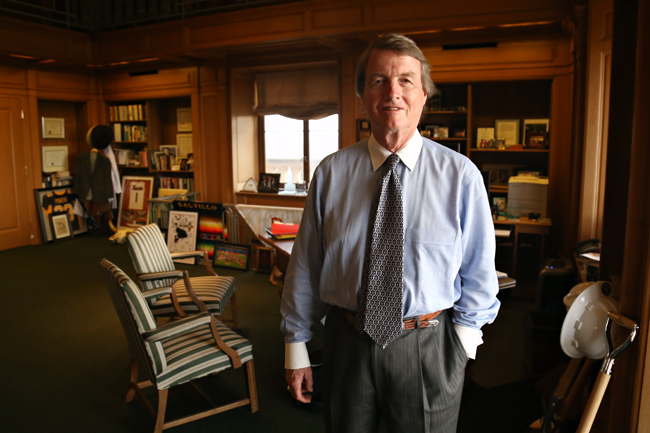Members of the UT presidential search advisory committee have begun interviewing candidates to replace President William Powers Jr., who announced in July he would be resigning after the end of this school year.
An advisory committee is working with consulting firm Spencer Stuart in the search for Powers’ replacement. According to a tentative timeline on the UT System website, the committee is conducting first and second rounds of interviews with candidates and will be making recommendations to the Board of Regents by the end of January.
UT System spokeswoman Jenny LaCoste-Caputo said the committee is on schedule to meet the January deadline; however, the Board of Regents is waiting until February to release the names of the candidates they decided to interview.
The committee is led by Pedro Reyes, System executive vice chancellor for academic affairs, and Larry Faulkner, UT-Austin president emeritus. The rest of the committee is comprised of members representing the Board of Regents, the UT System, the campus’ Dean Council, faculty, staff and Texas Exes. Geetika Jerath, international relations and global studies senior and president of the Senate of College Councils, represents the student body on the committee.
In July, Powers announced his plan to resign in a letter to former UT Chancellor Francisco Cigarroa. In the letter, Powers said he would remain at his post through the end of the legislative session in an effort to make the change of leadership more gradual and review legislation he felt would benefit the University.
“For all these reasons, an abrupt change now would seriously disrupt the progress of UT-Austin,” Powers said in the letter. “A more constructive course of action would be for me to step down as President at the conclusion of the legislative session.”
Powers’ announcement came after the System released findings of its own limited investigation into legislative influence over admissions. That inquiry, conducted by two System officials, found no evidence of wrongdoing, but determined instances where letters from legislators sent directly to Powers or a dean likely influenced the admissions process. Cigarroa initially told Powers to resign by October, but, after students voiced their support for Powers, Cigarroa released a statement stating Powers should remain in his position to complete his last initiatives for UT. However, Cigarroa said that UT was due for a change in leadership.
“While ultimately productive, the past years have not been without struggle and, at times, conflict and controversy,” Cigarroa said.
Cigarroa said that, despite the timing of the call for resignation, there was no single reason behind his decision to ask for Powers’ resignation but rather a series of problems.
“There was no single incident that prompted my decision to ask President Powers for his resignation last week, but a long history of issues with communication, responsiveness and a willingness to collaborate,” Cigarroa said.
In accordance with System rules, the committee will make the final recommendations for potential candidates to the Board of Regents, which will make the final decision on who will replace Powers.


















